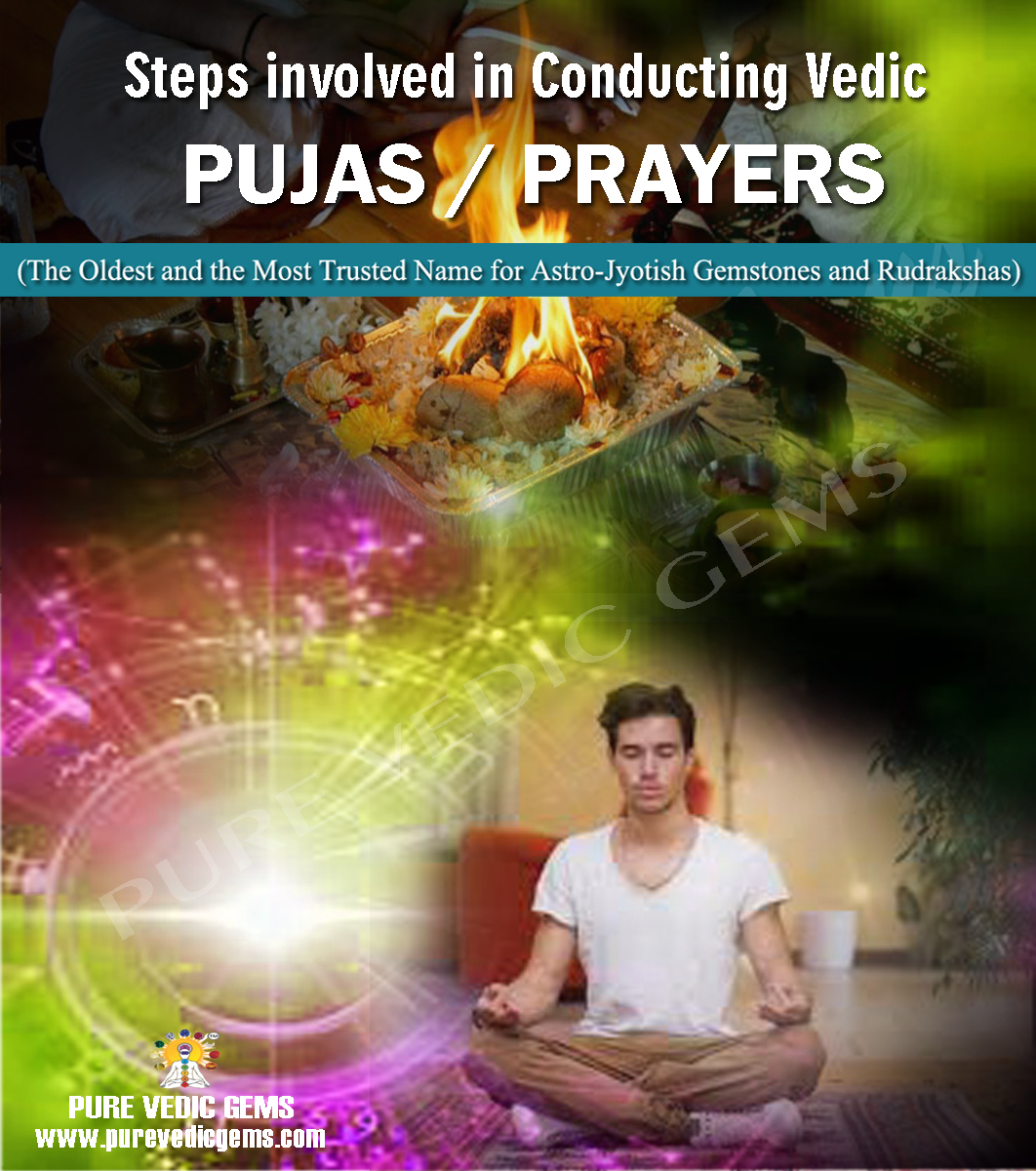Credibility Since 1937
World Wide safe & insured shipping
Indian Govt Lab & International reputed labs Certification
Complete in house setup of Vedic poojas & Energization as per authentic ancient rituals.

Worldwide Safe & Insured Delivery


There are 16 basic steps in conducting a puja in Hinduism. This is known as Shodashopachara, and is common to all pujas, irrespective of whom we are worshiping. Nowadays we are pressed for time and perpetually in a tearing hurry, and this time factor is coupled with one more thing: our ignorance and lack of desire to further our knowledge. But one must know the basic necessities in conducting a puja as not only will we ourselves benefit from the puja, but our next generation and subsequent generations too will learn from our actions and benefit. After cleaning and sanctifying the identified area for the puja, we beautify it with floor decorations, and install the deity with due respect and honour. This imbues a feeling of love and peace in our mind.
The Shodashopachara or 16 steps:
Avaahana & Dhyana: Installing the deity for the puja is akin to inviting an important person to our house, which we do with respect and humility( avaahana). While inviting him, we dwell upon his fine qualities (dhyaana).
Asan: we offer a place of honour to our guest to seat himself and be comfortable. In the case of gods/goddesses, we offer an asan or decorated mat, or a raised and decorated platform.
Paadya: In traditional (and rural) India – and in various texts, mythologies and legends we have read that kings have washed the dusty feet of their kulgurus or other rishis who have visited them – it is customary to wash the feet of a guest when he visits a family. Other than honouring them thus, one other reason could be that since nerve endings are found in our hands and feet, it is necessary to keep these parts of our body clean and cool. Hence, offering water to wash these body parts od deities is carried out in pujas.
Arghya: This means offering water to wash the hands of our guest.
Aachamana: By this we mean taking three- and only three – consecutive gulps of water. This act soothes our throat and all organs that are needed for speaking easily and agrreably, so that the sound thus emitted will be pleasant to hear.
Madhuparka: After offering water, the guest is offered a drink. If we add a few drops of honey to the drink, it is called madhuparka.
Snaan: Once our guest has rested, we make all necessary arrangements for the guest’s snaan (bath) so that he can freshen up. The deity is bathed with water, milk, dahi (yoghurt), ghee (clarified butter), etc.
Vastra: Next, fresh clothes are offered to the guest.
Gandh: Sandal paste (gandh) is applied on the forehead.
Pushpa: Pushpa means flower. In pujas, it is customary to offer different flowers to the deity even as we chant 108 names of that particular deity.
Agarbatti: By lighting agarbattis or incense sticks, we add to the already-fragrant and holy surroundings. Some schools of thought believe that inhaling the smoke of herbs is good for health.
Deepa: This word means light, and traditional lamps are lit to give due recognition to the Almighty as a form of light.
Naivedya: Next, the guest – or the deity – is offered a variety of dishes; this forms an important component of looking after and pleasing the guest. In no part of India will a guest not be offered some food, if not a full meal. Bhog is offered to the deity.
Tamboola: This word means betel leaf, and it is popularly believed that chewing betel leaf rolled up with assorted herbs after a meal helps in effective digestion. The betel nut symbolizes the ego and the hard coarse qualities that must be surrendered to the deity.
Aarti: This is done when the puja is coming to its closure. A flame of camphor and other oil items is systematically offered to the deity, reminding all present once again that the source of all light is God himself. The Aarti is then offered to the devotees as a form of blessings from the Almighty.
Mantrapushpa, Pradakshina: To propitiate the deity, mantras or prayers that are particularly dear to the deity are chanted during the puja.
Pradakshina or circumambulation means that God is present all around us, and we recognize his omnipresence.
Detailed information on these 16 essential steps to conducting a puja can be found in our Upanishads, Puranas and Vedas.
For 100% Natural, Astro-Rashi Approved, Lab Certified Gemstones/Rudrakshas:
Visit: Purevedicgems.in
Genuine Products and Satisfied Customers are our first and foremost priority

Firstly, I want to give compliment to the website. By chance, I came to know the shop from the Internet only. The design of the website attract me a lot as well as it gives many useful knowledge about Astrology, gemstones, etc. After that, I feel thankful to Mr.Vikas Ji and his staffs for their understanding, support me from A to Z and help me solve all my problems. Whatever I don\'t understand, they guide me very slowly, clearly and remove all my doubts. They are great people - I have to say!!! Thanks a ton. Finally, the products are very good and give me positive result till now (nearly 3 months). The rings are well-designed - even many Indians, they also gave me compliments on the rings; the gems are high quality - very stunning. Just only compliments - no any doubts. I definitely come back and purchase more products from this shop. In the future, if anyone need Astrology products, I will highly recommend Pure Vedic Gems to them!!! With love and all my best wishes to all of you! Yen Van (VietNam)
As recommended by Astrologer, I purchased the gemstones. I must say that they have a Unique role. After 3 months of wearing them, intuitively these have guided me in the right direction and given me a lot of strength in my convictions and getting beyond false sense of securities in life. Rest future will tell, how these prisms actually affect one. I am grateful to Vikas Mehra Ji for his time, his advice and detailed and patient way of dealing with customers. Thank you! Regards
The service was wonderful. Delivery and updates were very prompt and the pictures were incredibly appreciated. The ring itself has been fantastic. I wear it everyday and can feel the effects of it. Very grateful to have found you and will recommend you to friends looking for gamestones and use your service for any of my own future needs!
Hare Krishna All I bought two gem stones from Pure Vedic Gems. I was bit confused about gem stones because it was my first time experience. I cruised around many websites and made phone calls in India, but didn\'t get any satisfactory answers. I contacted Pure Vedic Gems, they followed up my quiries nicely. Vikas ji the owner of Vedic Gems gave me very valuable advices. It took me long time to finalize the products, but staff had lots of patience. Pure Vedic Gems team answered all my questions and helped me to select the products. They helped me on every step of this process. I will highly recommend Pure Vedic Gems to any customers especially Overseas Clients, because it is very hard to find right place to buy gems with complete package (including rings). They have given certificates of Gems and done the proper puja process too. And one more thing to mention, they have Astrologer Team which can help you out if you are not sure of right gem for you on very nominal charges. Full marks to Vikas Mehra ji and his team. Thanks a million Regards Baljit Bains
It was great talking to Vikas, I found him very knowledgeable, and he helped me choose the right product. Pure Vedic Gems team equally is very very helpful, He always sorted out all my quaries & was very responsive.I received the product on time & its a wonderful peace of gem. One doesn’t need to worry about product’s authenticity when buying from Purevedicgems.
Right away as soon as I started my order i was contacted by pure vedic gems team to make sure everything was set up perfectly for my ring to be made. They walked me through the whole process up to delivery. The stone was very good quality and well energized and I felt the difference as soon as I started wearing it. The craftsmanship of the ring was great aswell. I am grateful to have found purevedicgems and I cant wait to make my next purchase :)
Hi Vikasji, Its my pleasure to write feedback about the interaction that we had. I am very impress with the quality of the gemstone, reasonable pricing, finishing and perfection with with it is embedded into ring. The overall services such as - day to day interaction , resolving queries with quick responses and delivery on time in secure packing. I had received excellent customer service for first purchase of a another gemstone last year, the same experience this time as well. I would continue to use Purevedic for future purchases and would highly recommend to others.
A Final end, destination when u are searching for pure unheated untreated Vedic Gemstones. The Very first day when I saw website and videos of oceanic knowledge and an unsaid promise for pure Ratana and consultation. I wish Mr Vikas ( whom I have never met ). But I wish to..... But I bought Emerald from Pure Vedic Gems. It\'s really very nice quality as promised. Nowadays when every one in market promises for true stones, the one trusted stop is Mr Vikas whose true and valuable guidance will surely make u go for a real stone , none other than Pure Vedic Gems. My best wishes are with them and Vikas ji too.. May the supreme power, lord of us all shower blessings on them...
I bought 2 gemstones (Yellow Sapphire & Red Coral) from Pure Vedic Gems and I am very pleased with the products and customer services. The gemstones were high quality and very beautiful. PURE VEDIC GEMS teams was very helpful throughout the journey. He helped me from the purchase to delivery of the product. Thank you






